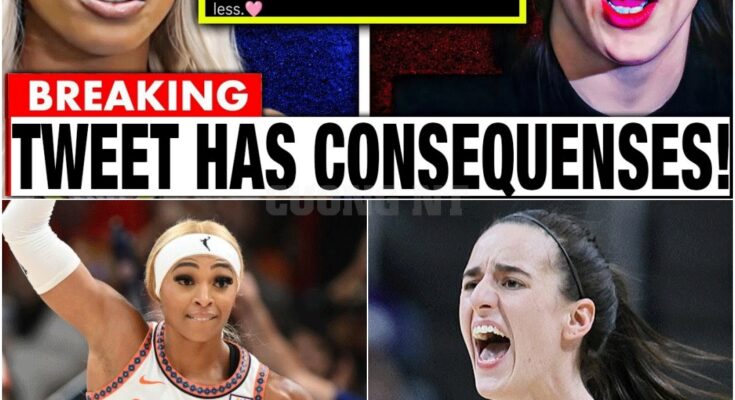DiJonai Carrington FINED After Clash with Caitlin Clark and Fans—Is the WNBA Ready to Face the Fire?
DiJonai Carrington is once again in the headlines—but this time, it’s not just for a hard foul or heated play. The WNBA has reportedly fined the Dallas Wings guard for unsportsmanlike conduct following a high-profile confrontation with Indiana Fever rookie Caitlin Clark and a post-game clash with fans. The fine wasn’t just about the on-court contact—it was also about what happened afterward, when Carrington took to social media to defend herself against what she called a “false narrative” and respond to fans she felt crossed the line.

What’s undeniable is that Carrington’s foul on Clark went viral in minutes. Fans slammed her as a “dirty player,” with some even using racially coded language like “thug”—accusations that stung deeper than the foul itself. The debate quickly spilled beyond the basketball court, touching on identity, aggression, and how Black female athletes are portrayed in the media.
The foul itself, caught in high definition from multiple angles, shows Carrington taking a hard swipe at Clark during a drive—what some called a blatant cheap shot. Others argued it was just “hard-nosed basketball.” But it wasn’t just the play that drew scrutiny. Carrington’s fiery clap-back to hecklers and social media users ignited another wave of criticism. “Y’all fans swear I’m such a dirty player,” she tweeted. “I just play hard and never give up on a play.”
That defense didn’t sit well with everyone. Critics called it gaslighting, pointing out a string of similar incidents involving Carrington—an eye poke to Clark in the 2024 playoffs, a dangerous foul on Skylar Diggins, and a landing-zone violation against Gabby Williams, all in the span of a year. Many argued that this isn’t a case of “playing hard”—it’s a pattern.
But for some, the backlash revealed a different issue entirely. Carrington’s defenders say she’s being vilified not because she’s reckless, but because she refuses to be silent. Her refusal to conform, to apologize for her style, and to bow to fan pressure has made her a lightning rod for controversy. Some fans praised her for calling out what they see as double standards faced by Black women in professional sports. “If a white player did this, would we still be calling them thugs?” one supporter asked.
The WNBA Players Association echoed that sentiment, issuing a statement condemning the racist and misogynistic abuse Carrington received online. Even Caitlin Clark herself stepped in to say that no athlete deserves to be targeted with hate, no matter how heated the competition.
Still, the fine stands. And for many, that’s not enough. Fever fans called the punishment “a slap on the wrist” and are demanding a suspension, citing player safety and league standards. They worry that the WNBA’s brand—newly bolstered by stars like Clark—is at risk if incidents like this continue unchecked.
On the other hand, Wings fans argue Carrington is being unfairly scapegoated. They claim that the growing media attention around Clark has created an environment where any contact with her is immediately painted as malicious. They also argue that Carrington’s passion and grit are exactly what the league needs—players who won’t back down and who play with fire.
But that fire has its consequences. After the foul, a WNBA referee reportedly had to call security during a post-game exchange with Carrington—a move almost unheard of in the league. Footage showed a guard physically separating Carrington from the officials as tensions escalated. The league hasn’t officially commented on the incident, but it added weight to the decision to fine her for unsportsmanlike conduct.
This episode has become about more than a foul. It’s now a flashpoint for how the WNBA handles not just physical play, but also race, gender, and media scrutiny. Carrington has since leaned into her role as a vocal advocate for racial equity in sports, calling out what she sees as systemic bias in how players like her are covered.
As the league grows in popularity, thanks in large part to breakout stars like Clark, these issues will only become more visible. The WNBA’s handling of this situation will set a precedent for how it supports both its veterans and its rookies, and how it responds to controversy fueled by deeper cultural tensions.
Carrington’s story isn’t over. Whether fans view her as a villain or a victim, she’s forced the WNBA to confront uncomfortable questions about fairness, identity, and the future of the game. One thing is certain: the league can’t afford to look away.

